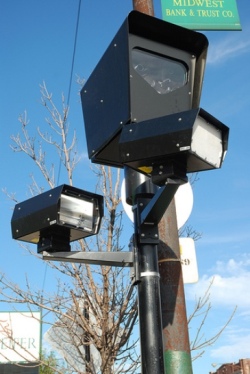Speeding Cameras Could Reap Hundreds Of Millions In Revenue In First Year
By Chuck Sudo in News on Aug 12, 2013 2:20PM
The Emanuel administration’s plan to install up to 300 speeding cameras near parks and school zones was always expected to generate tons of revenue for Chicago. The Tribune reports how much the city stands to reap from motorists exceeding the speed limits in those zones.
Based on a monthlong trial of the speeding cameras at four locations across the city, the Tribune estimates revenues far exceeding the $30 million the Emanuel administration projects—try talking hundreds of millions of dollars in the first year of the program alone. The Chicago Department of Transportation is installing cameras in a dozen locations by the end of September and in 50 locations by the end of the year.
Cameras installed by Xerox, which was in contention to win the contract for the program, at McKinley Park captured an average of 874 speed violations per day—57 violations per hour. Near North Montessori School on West Division Street averaged 366 violations per day. One motorist was clocked speeding through a school zone at Dulles Elementary on the South side driving 58 MPH, with a pedestrian present.
Overall, Xerox and Arizona-based American Traffic Solutions (which won the $67 million contract) captured 93,000 violators at the four pilot sites during the December trial. American Traffic Solutions spokesman Charles Territo said he was “shocked at the numbers” and backed Emanuel’s claim the program is being implemented with safety in mind. Had tickets been issued to all of the offending motorists, it would have generated $4.7 million in revenue. The first cameras will be installed at four locations this week, with a total of 12 locations up and running by the end of September and 50 by the end of 2013.
CDOT told the Tribune they expect revenues of $40-$60 million from the cameras and that using the numbers from the pilot program to estimate what they could generate isn't ideal, citing a number of factors as to why those numbers will decrease. CDOT official Scott Kubly, who will oversee the program, said the cameras will lead to “a dramatic change in the way people behave and the way people drive.” Kulby said CDOT will embark on a major marketing campaign to educate motorists on the program so that they have time to change their driving habits before the 30-day grace period where only warning citations are issued expires at each camera location.
Kulby added the pilot program locations were chosen because of their high traffic volume and that not all of the locations will see the traffic of those four stops, which will mitigate the revenue projections.
